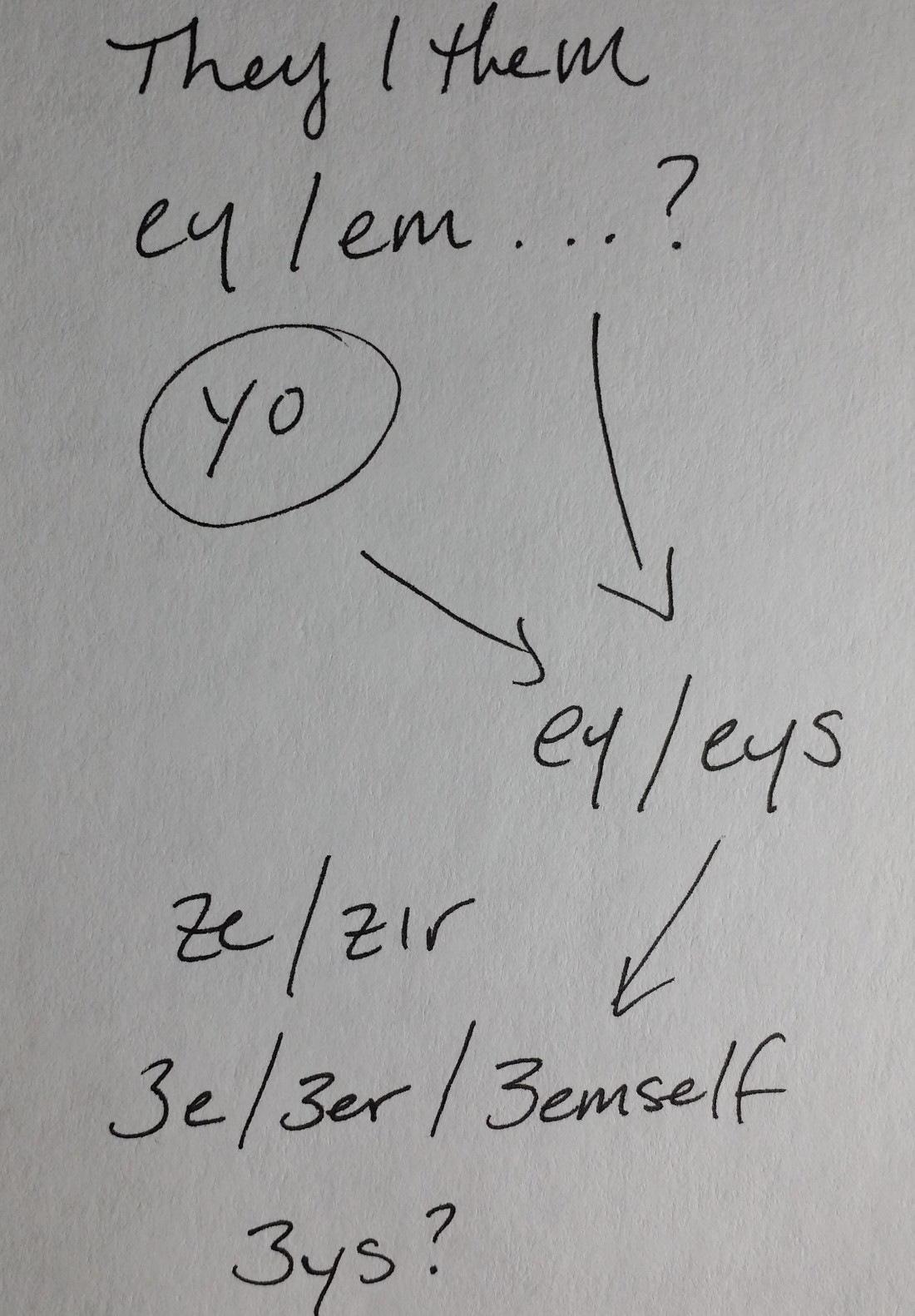Finding the ideal nonbinary pronoun for fiction
I’ve been working on the Just Girls sequel and playing with some science fiction, so I’m obsessing about nonbinary pronouns. In the Just Girls sequel, I’m using the pronoun “yo” for Nico. (Or, rather, Nico’s using that pronoun for yoself, but when I say that my characters talk to me, people give me odd looks.)
But I wanted to try some additional pronouns in case I like something better. “They/them” pronouns in the singular is becoming more and more popular in spoken use, but it’s tougher in fiction. For example in this dialogue:
“Their new jacket looks great! Did they make it themself?
“It’s from their parents. They gave it to them for their birthday.”
I find that last sentence very frustrating. I’m a big fan of “they/them” applied to individuals, but I’m an even bigger fan of clarity and ease of reading. In my experience, “they/them” works much better in spoken use than in fiction.
I was hoping to get around it by using Spivak or Elverson pronouns, which are the “they/them” set without the “th”: ey/em/eir/eirs/emself.
These pronouns are not as easy to write with as I want them to be. It’s possible this is because I’m spoiled by the ease of yo/yos. Let me demonstrate:
The pronoun “they” has 5 forms, which I’ll show here in both plural and singular use:
Nominative: They laugh. They laughs.
Accusative: I’ll say hi when I see them. [same for both plural and singular]
Pronominal possessive: Their faces were smiling. Their face was smiling.
Predicative possessive: They gave me theirs. [same for both plural and singular]
Reflexive: They hang out with themselves. They hang out with themself.
It’s the same for “ey/em” pronouns:
Nominative: Ey laughs.
Accusative: I’ll say hi when I see em.
Pronominal possessive: Eir face was smiling.
Predicative possessive: Ey gave me eirs.
Reflexive: Ey hangs out with emself.
Now let’s look at “yo/yos”:
Nominative: Yo laughs.
Accusative: I’ll say hi when I see yo.
Pronominal possessive: Yos face was smiling.
Predicative possessive: Yo gave me yos.
Reflexive: Yo hangs out with yoself.
See the difference? There are only 3 forms instead of 5! That might not seem like a big deal, but when you’re writing thousands and thousands of words, it gets to be.
The downside of “yo/yos” is that few people have heard of it and the spontaneous use of it was only in the nominative. With “they/them” gaining greater acceptance, the “ey/em” pronouns seem like a really smart choice.
So I’m wondering, if I really love the easy of the 3-form pronoun, can I alter the “ey/em” pronouns to be that? Here’s how it would work:
Nominative: Ey laughs.
Accusative: I’ll say hi when I see ey.
Pronominal possessive: Eys face was smiling.
Predicative possessive: Ey gave me eys.
Reflexive: Ey hangs out with emself.
Why “eys” instead of “eir?” Because I don’t think a possessive sounds natural to English speakers without an “s” on the end. This means people would try to say “eirs” and we’d end up with 4 or more forms again.
Other benefits: “eys” does not sound like an existing word the way “eir” sounds like “air.” It also does not rhyme with either “hers” or “his” just as “ey” doesn’t rhyme with “she” or “he.” Because “ey” does rhyme with “they,” I think it sounds pronouny in a non-gendered way.
Before you make up your mind, check out these paragraphs using different pronouns and ask yourself both if it sounds good to you as a reader (feel free to read aloud) and if you could imagine yourself writing an entire book using these pronouns.
I took a quote from Jacqueline Woodson’s “From the Notebooks of Melanin Sun,” because I’m a fan and I wanted to use something young adult. I’ve changed the first word (from “Mama”) to make the passage less gendered.
Ze/zir/zirs/zirself
Ze had a small fit talking about how we can’t afford twenty-two-dollar shades. Then ze tried them on. Checked zirself out in the mirror. Checked me out checking zir out. “Can I borrow them, Mel?” It’s like that in our house.
They/them/their/theirs/themself
They had a small fit talking about how we can’t afford twenty-two-dollar shades. Then they tried them on. Checked themself out in the mirror. Checked me out checking them out. “Can I borrow them, Mel?” It’s like that in our house.
Ey/Em/Eir/Eirs/Emself
Ey had a small fit talking about how we can’t afford twenty-two-dollar shades. Then ey tried them on. Checked emself out in the mirror. Checked me out checking em out. “Can I borrow them, Mel?” It’s like that in our house.
Yo/yos/yoself
Yo had a small fit talking about how we can’t afford twenty-two-dollar shades. Then yo tried them on. Checked yoself out in the mirror. Checked me out checking yo out. “Can I borrow them, Mel?” It’s like that in our house.
Ey/eys/eyself
Ey had a small fit talking about how we can’t afford twenty-two-dollar shades. Then ey tried them on. Checked eyself out in the mirror. Checked me out checking ey out. “Can I borrow them, Mel?” It’s like that in our house.
Bonus opportunity: write the following dialogue replacing all the “she/her” pronouns with the pronouns of your choice:
She laughed and asked me, “Have you seen Sam?”
“Not yet, I’ll say hi when I see her.”
“Her knife-throwing skills are unmatched!”
“I know, she gave me one of hers, but I can’t hit anything with it.”
“That’s because of all the time she spends by herself practicing.”
And now, let me know which nonbinary pronoun you like best for fiction! Thanks!

